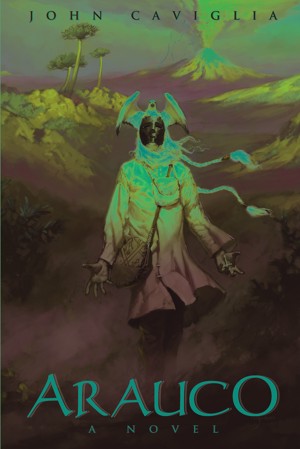Location: United States
Member Since:
April 25, 2011
John Caviglia
Biography
John Caviglia was born in Chile, his father a chileno, his mother an adventurous gringa from Muncie, Indiana. His family moved to the United States when he was eight. He has been a professor of Spanish and Comparative literature, and also taught pottery and martial arts. His passions include reading and writing, photography, cooking and organic gardening, and the making of cedar strip canoes, in which he explores wilderness lakes with his wife.
Where to find John Caviglia online
Books
Arauco: A Novel
by John Caviglia
Price:
$3.99 USD.
Words: 302,830.
Language:
English.
Published: February 21, 2013
.
Categories:
Fiction » Historical » Colonial America, Fiction » Cultural & ethnic themes » Hispanic & Latino
(5.00 from 1 review)
In 1540 the Spanish invaded the land now called Chile, meeting indomitable resistance from the Mapuche. For the first time, Arauco tells this war from both points of view. Its pages include the conquistador, Valdivia, his beautiful mistress, Inés de Suárez … and his scribe, Juan. Abducted by Mapuche and taken to live with the albino shaman, Ñamku, Juan comes to love the Mapuche girl, Raytrayen.
Smashwords book reviews by John Caviglia
-
Against Walls
on June 24, 2013
Amgalant One: The Old Ideal takes the beginning of the slim volume that is The Secret History of the Mongols (which, in the edition I found at Amazon, has fewer than 200 pages of verse) and enlarges it to create a compulsively readable, immersive world. And as this work--roughly six hundred pages in itself--begins an audacious trilogy intended to expand the whole of The Secret History, the prospective reader might ask why, and how, Hammond has so amplified the spare original.... As to the why, it's clear that she is herself enraptured by the time, the place ... and above all the historic characters she fleshes out to live their complex tribal lives. Hammond has researched every aspect of her enterprise, not to harass us with needless historic detail, but to make sure that the experience of the reader will be full and genuine. This is your chance to travel in space and time, and BE THERE, as the Temujin of the text--one day to be known as Genghis Khan--is fashioned into what was prophesied at his birth, when he was born with a blood clot in his fist. You learn what the Mongols eat (a lot of sheep, it seems) and drink (black milk!). You discover many other things about their tribal culture. But essentially, the novel takes you into the minds of the protagonists as the Secret History plays itself out.... Seeing as Mongols saw each other, and the world (I got a new take on ancient China, and the wall intended to keep barbarians out), is where much of the action takes place. Interior conflicts.... Interior/exterior conflicts.... Interior monologues.... Interior dialogues ... trialogues...? Tribal conferences. Alliances with Tartars? War? What to do? Questions are at the heart of this version of the Mongol enterprise, when the future of much of the world could hinge on a shaman's reading of the cracks in a sheep's scapula. The rise of Genghis Khan might have been prophesied, but in this novel it was a supremely complicated thing to those who lived the beginnings of the largest empire known to man in tents. As for the novel's actual prose, there's an aspect that at first was hard for me to get a handle on.... Hammond is totally (gleefully!) anachronistic, both in authorial commentary and in the speech and thought of her characters, so that the 13th century is displayed through contemporary, sometimes slangy, language. Ta! If you are bothered by anachronism, you will be bothered. As for me, once I adjusted, I thoroughly enjoyed the ride, for Hammond's writing is rich, nuanced, humorous. Also, since there is no record of how her protagonists actually spoke, by simply abdicating from the attempt to "translate" their tribal language(s), she avoids the clunky linguistic contrivances of novelists that attempt to fake ancient and foreign, never written speech.... And I loved the strength and wisdom of the women in this novel, which surprised me, given a society in which they could be one of the spoils of battle. In sum, Amgalant is a rare and different, wonderful read, although not always easy. Hats off to Hammond for her long, loving and continuing discipline. I look forward to reading the next volume.

